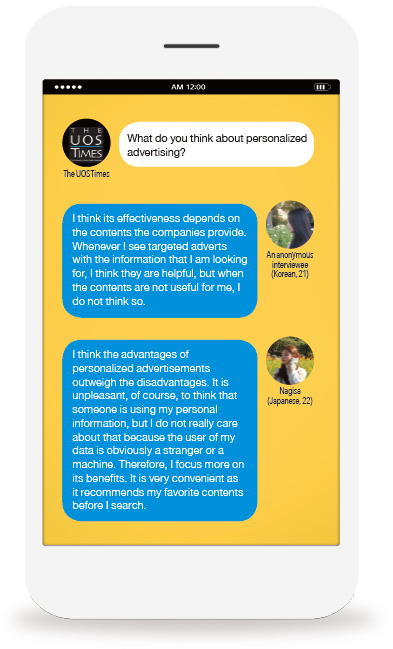
Whenever people use social media, they encounter a certain type of commercials that may surprise them. People often see advertisements of products they recently searched on the internet or merchandise suited for their age. For instance, social media provides targeted advertising to get one’s attention with the following kind of phrase. “We are providing discount for people who were born in 1999.” Those types of commercials named “Personalized Advertisement” currently have become a leading marketing strategy of most companies.
There have been many controversies surrounding the effectiveness and side effects of personalized advertising. In this context, The UOS Times surveyed 200 students at the University of Seoul (UOS) in order to get their opinions on this issue. The questionnaire consists of six questions asking one’s perceptions of personalized commercials and private data protections. The survey results showed that over half of respondents had negative impression on the personalized advertisement and they had concerns about the danger of personal information leakage. Despite of unfavorable views, however, we found out many students have accessed and utilized information provided by the ads and some of them thought it was helpful. Based on this paradoxical result, The UOS Times looked into the advantages and disadvantages of the customized ads.
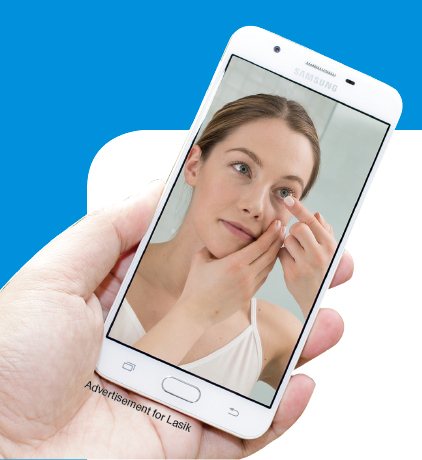
Development of Personalized Advertisement
The personalized advertisement is a kind of commercial that provides customized ads by analyzing one’s online behavioral information. The early form of that is a “Search Advertising.” It displays relevant commercials based on search keywords and directly induces consumers to click. However, that requires a lot of expenses because of pay-per-click system. In an effort to reduce that cost, “Retargeting Advertisement” emerged with advanced technology. It reflects the visitor’s browsing history and shows the previous accessed site automatically. The next step is “Contextual Advertising” which analyzes the contents of the website. As you can see them easily at the bottom of blogs, the adverts are quite relate to the content of the post. Nowadays, the efficiency and accuracy of the ads have risen dramatically due to the big data technology. Using this highly developed technology, advertisers can collect and analyze consumers’ data in real-time and it brought huge innovative changes to both consumers and marketers ever than before. This enabled consumers to get tailored benefits and the companies to make a huge profit with an increasing access rate.
Pros and Cons of Personalized Advertisement
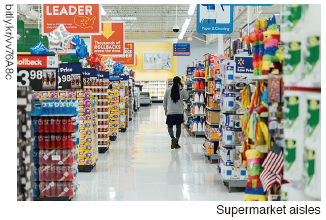
Personalized advertisement is a double-edged sword as it both has merits and demerits. When it comes to shopping, this type of advertisement provides some advantages to consumers. By using information recommended through the advertisement, consumers can reach the ideal product much easier compared to someone not using it. Here is a simple example of why some people are enthusiastic for the personalized advertisement. Consumer A is a person who loves playing golf currently looking for a new credit card. One day, while using social media, A found personalized advertisement of one particular credit card providing discounts on a golf resort. Utilizing this information, A could easily find the credit card suited to A’s spending pattern without wasting time comparing a thousand varieties of cards. Personalized advertisement is not only helpful for consumers but also for producers. In the past, most companies sent emails or messages to unspecified masses to promote their goods. However, this strategy failed to attract consumers. Many people did not react to general information that was not useful to them, so companies start to categorize people and provide personalized advertisements. This new tactic contributed to accessing customers with higher purchase probability at a lower cost. The effectiveness of personalizing strategy has been proven gradually and now it became a popular marketing method. According to a study conducted by a marketing corporation “Demand Metric” in 2016, 80 percent of marketers agreed that personalized contents are more effective than general advertisements.
Despite of this advantage, the personalized advertisement also has disadvantages. Many consumers worry that the way of storing information by big data analytics for advertising may violate their privacy. In fact, at the supermarket franchisee “Target” in the United States in 2012, those fears became reality. Customer B who has a high school student daughter started to get adverts of baby goods. He was very angry at the inappropriate advertising until he found out his daughter was pregnant. The essential of this case is that “Target” knew the daughter’s private information even before her family did not notice. This clearly shows that collection of big data for providing personalized commercials may invade one’s privacy. In order to create personalized advertisements, a wide range of one’s private information is collected. Using big data analytics, advertisers including “Target” analyze a broad range of personal information including one’s race, salary, gender, age and even the time when people buy a certain product at the store. Based on these data, advertisers create a mathematical formula that estimates expectant consumers’ spending patterns. By creating various types of consumer groups with stored data, they provide targeted advertising. This process of collecting information trigger fears that personalizing ads may invade one’s privacy.
The survey we conducted also shows that many students of UOS have concerns about invasion of privacy. In question 5, over half of respondents answered stricter policy is needed to minimize personal information leakage caused by customized ads. With this result, The UOS Times searched the relevant laws to see how current regulations are securing our data.
Personal Information Protection Act of Korea
In Korea, national law specifies that the companies should collect personal information to a minimum. On the basis of that clause, the government has adopted an “opt-in” policy that requires users’ prior consent for using their information. Another related regulation is that the companies should receive user consent by dividing mandatory and optional terms. It helps to prevent companies to gather excessive data since the optional items contain personal data that is unrelated to the services we receive. In addition, in order to respond to growing concerns, Korea established a guideline on personalized commercials in 2017 to prevent leaking of private information. This guideline includes: to clarify the fact that users’ information is being collected and used, to ensure compensation for damages caused by customized advertising. If we only look at the written acts and guidelines, it seems Korea has a well-organized system for avoiding personal information abuse. However, survey results clearly show that most students do not feel safe under this system. A few loopholes in current policy are making discrepancies between legal ideals and reality bringing insufficient protection for the information leakage issue.
Foreign companies like Google and Facebook do not have to follow domestic laws, so they have collected comprehensive data such as YouTube viewing records and location information. It is possible to check them by log in to those sites and look into the menu called “data-and-personalization.” In addition, users hardly recognize that their data is being collected because the above guideline does not specify concrete details. For instance, there is a doubt that who understands the customized advertising mark (explained next paragraph). This contrasts with the United States (USA), which puts a definite sentence in the advertisements. Above all, the guideline is just a self-regulating system so the companies do not have to follow compulsorily. In sum, although Korea has enacted laws and guideline to minimize side effects of personalized commercials, the loophole the system have made people think their information is not being fully protected.
Ways to Collect Data
You may have seen the above type of commercials, which means you are also a target of personalized advertisements like almost everyone else. It also means companies has data on your online activity. However, most of us are not aware of providing such information to companies. Then how do they collect our data?
“Online behavioral information” refers to the online activity data grasps users’ interests by accessing their website visits, app usage history, purchases and searches. Advertisers still come up with many ways to get them. Among them, there are two types of information most commonly collected. The first to explain is “cookies” which are sent by web-browser to the user. Cookies are files that contain data created when you visit websites. The websites receive cookies such as search histories and passwords in forms of text files. Then, the web-servers bring back the last visit records when the users access their pages again, so the speed of connection is enhanced a lot. Next, “Search Queries” also offer the key data to the companies. It simply means users’ search records. The company uses frequency of search-words as a basis of inferring personal interests and lifestyles. Those data play huge role in customized advertisements.
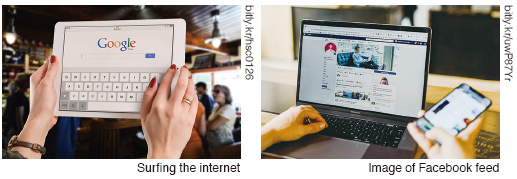
Ways to Get Rid of Personalized Advertisements
In the survey question number 6, over 70 percent of respondents said if there is an option for restricting personalized ads, they will use it. This result brought us a question as follows: “Is there actually a way not to see personalizing commercials in social media?” The UOS Times found out the answer to this question is “Yes”. Last year, Facebook decided not to offer personalized advertisements after being harshly criticized by the masses due to its private information crisis. Facebook users can choose not to send their information to advertisers using the “Off Facebook Activity” option. Not only Facebook users, but also users of other social media can protect their privacy from personalized advertisements. In every advert, there is a small round mark and by clicking this mark, people can access their information setting options. Moreover, blocking gathering information activities by cookies can also be an effective way to get rid of personalized advertisements.
Personalized advertisement rapidly became mainstream in the marketing industry, bringing benefits as much as drawbacks. The research we conducted showed that students of UOS were ambivalent toward customized promotions, however, they tended to have more concerns on the information leakage problems. In order to see how current regulations are securing our data, The UOS Times dealt with current “Personal Information Protection Act.” As voices of criticizing the invasion of one’s privacy get stronger, rectifying loopholes of regulations in a more realistic angle seems necessary.
Survey
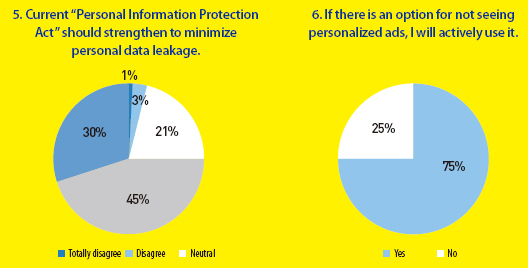
Hong Sung-hwa
hsw0026@uos.ac.kr
Jeong Ji-eun
jjen1026@uos.ac.kr

